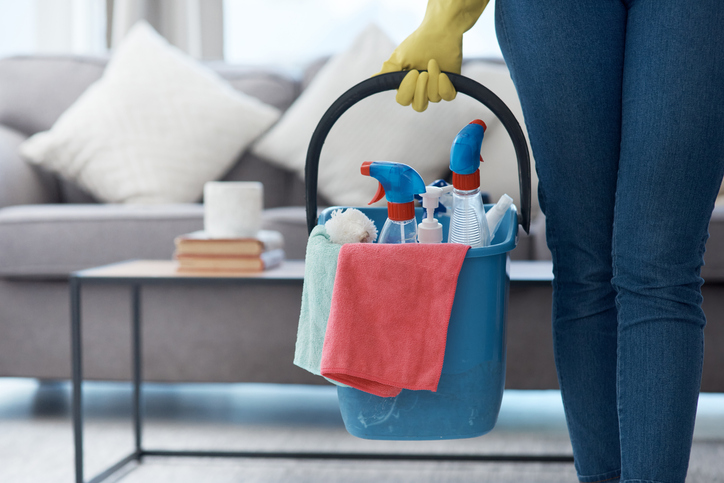Spring cleaning season is right around the corner, which means at the moment you may be creating a list of items you’ll need to spruce up your house. If there are any cleaning products on the list you may want to check the ingredients.
Some cleaning products are much more harsh than others. They contain chemicals that clean up stains, dirt and grime, but in the process they can release particles into the air that aren’t good for your health or energy efficiency. This quick read will explain the connection between cleaning products, air quality and energy efficiency so this spring you get your home clean without increasing the utility bill or harming your health.
Cleaning Products and the Air Quality of Your Home
Let’s discuss the issue of air quality first since it rolls into energy efficiency issues. Indoor air pollution is a serious problem that can impact the health of everyone living in the home, and cleaning products are a major contributing factor.
Whenever a cleaning product is used it releases particles into the air. This is quite obvious to the naked eye when you use cleaners that come in spray bottles. But cleaning products can release particles even if the product isn’t sprayed into the air.
One indicator that a cleaning product is releasing particles into the air is the smell. Aromas are generated by tiny air particles called odorants. The aroma of some cleaning products comes from chemical fragrants known as monoterpenes. These chemicals evaporate in the air easily, and once they do they interact with the ozone to create harmful air particles known as secondary organic aerosols (SOAs). These effects can be similar to the number of pollutant particles on a busy urban road.
Many cleaning products have a number of other harsh compounds that vaporize easily at room temperature. These chemicals are known as volatile organic compounds (VOCs), and they can be very harmful for a person’s health. Inside the bottle VOCs are contained, but the second the bottle is opened or sprayed the particles are free to float through the air. The VOCs in cleaning products have been linked to occupational asthma, chronic respiratory problems, eye irritation, throat irritation, allergic reactions and headaches.
Some air particles are extremely small, which is detrimental for your health. The smaller an air particle is, the deeper it can go in the body. Some particles that are breathed in can actually get into the bloodstream. There are also air particles that are large in size. These are the particles that aren’t good for your HVAC system.
How Air Pollutants Reduce Energy Efficiency
Air pollution is very bad for our personal health, but it’s also bad for the health of your HVAC system. Centralized air and heating systems work by constantly circulating the air inside the home. As it circulates in the system, the air passes through a filter.
The primary function of the filter is to capture air particles so that they don’t get into the HVAC system and damage components. Air particles that get past the filter can build up on the components, causing them to work less efficiently. And over time the filter captures so much that air can’t pass through it as freely. This makes your HVAC system work harder to push air through. The Department of Energy has determined that when this happens it can reduce the energy efficiency of your HVAC system by as much as 15%.
All you have to do is take a look at a used air filter to know why air particles aren’t good for your HVAC system or your health. Even in homes that are cleaned regularly, indoor air quality is going to be an issue that has to be addressed.
Tips for Cleaner Spring Cleaning
Below are a few things you can do to minimize how much cleaning products affect the indoor air quality of your home. Ultimately, all cleaners are going to impact air quality and energy efficiency to some degree, but the goal is to reduce it as much as possible.
Opt for Natural Cleaners
There are more cleaners available today than ever before, but many natural cleaners that have been used for centuries work extremely well without generating as many VOCs and SOAs. These well-proven natural cleaning products include:
Citrus
Basic soap and water
Baking soda
White vinegar
Borax powder
KEEP READING: Green Cleaning Products to Use for Your Spring Cleaning
Avoid Cleaning Products That Use Fragrances
Fragrances are additives that don’t enhance cleaning beyond improving the smell. Again, this is an indicator that particles are being released into the air. The fragrance ends up being just one more cause of air pollution in your house.
Only Use Cleaning Products as Needed
The less you use a cleaning product, the better it is in terms of air particles. Only use enough product to get the job done, clean up any excess product afterward and always keep cleaning products completely sealed.
Change or Clean Your Air Filter Regularly
As noted above, air particles clog up an air filter and make the HVAC system less efficient. A dirty air filter also won’t be nearly as effective at clearing the air of potentially harmful particles. The easy solution is to clean or replace your air filter regularly. Experts recommend changing out or cleaning air filters at least once every 1-3 months.
Live greener and cleaner every day with Verde Energy. We understand that clean energy is good for human health, which is why we offer green energy plans that help reduce the amount of pollution that’s generated by traditional electricity sources.
Use your zip code to look for available Verde Energy plans in your area!



